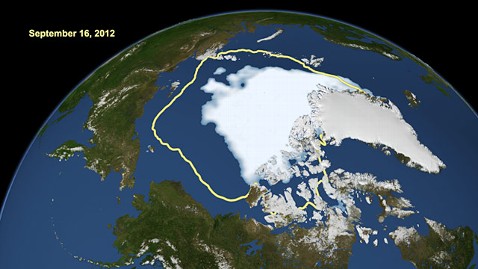Arctic Sea Ice at Lowest Extent Ever Recorded

An image of the Arctic sea ice on September 16, 2012, the day that the National Snow and Ice Data Center identified to be the minimum reached in 2012. Image: GST/NASA/GSFC
Sea ice around the North Pole melted away to record-breaking levels over the summer of 2012, surpassing the previous 2007 record by 293,000 square miles - an area about the size of Texas.
The northern polar ice cap measured 1.32 million square miles on Sunday, according to the National Snow and Ice Data Center ( NSIDC) in Boulder, Colo. The 2007 record was 1.61 million square miles.
The trend continues a downward spiral that a majority of climate scientists say is being accelerated by humans burning fossil fuels, contributing to a greenhouse effect that is warming the planet.
Since 1980, the amount of Arctic ice lost roughly equals the combined area of all states east of the Mississippi, plus Minnesota, Iowa, Missouri, Arkansas, Louisiana, Nebraska, Kansas and the Dakotas, NSIDC director Mark Serreze told ABC News.
"We are now in uncharted territory," Serreze said.
Scientists have been tracking Arctic ice using satellites since 1979. The ice melts over the summer and then refreezes during winter. Scientists worry, however, that the ice isn't as "healthy" as it used to be. Thick "multiyear" ice capable of surviving warm summers is increasingly replaced by thinner ice that is more vulnerable to rising temperatures.
As a consequence, disappearing sea ice (which reflects much of the sun's energy) reveals darker sea water underneath, absorbing more of the sun's energy and speeding up warming.
The effect of losing what scientists sometimes refer to as "the refrigerator at the top of the planet" goes far beyond the Arctic.
New research suggests a changing Arctic may cause weather patterns like the jet stream to shift, leading to more extreme weather in the United States and around the globe.
While melting sea ice is already floating and does not increase sea level, warming ocean waters can affect what happens in places like Greenland. As ice calves off the land into the water, sea level rises. If Greenland melted away completely (and that won't happen anytime soon), scientists say global sea level could rise by about 20 feet.